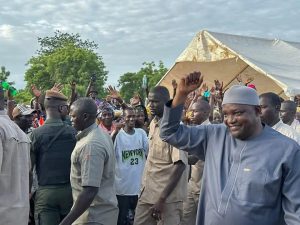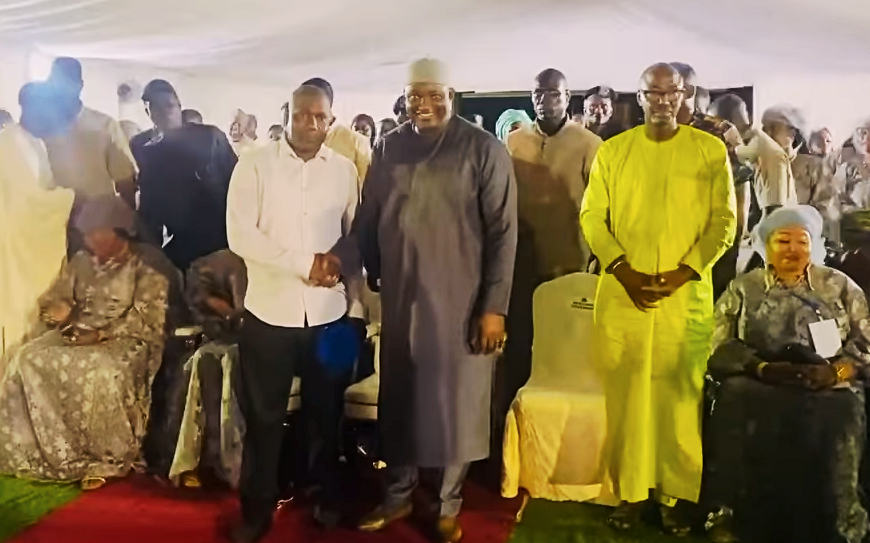Gambiaj.com – (Janjanbureh, The Gambia) – In a surprising political reversal, Bai Sankareh, one of the most vocal figures in the rebellion against the National People’s Party (NPP), has publicly rejoined the ruling party, pledging allegiance to President Adama Barrow and apologizing for past criticisms. His return marks a significant setback for the newly formed National Democratic Party (NDP), which has been trying to position itself as a credible opposition force made up of disillusioned former NPP militants.
Sankareh made his dramatic comeback at an NPP women’s rally held over the weekend in Janjanbureh, where President Barrow was in attendance.
Taking the stage, Sankareh addressed the party leadership, extended apologies to NPP administrative secretary Seedy Ceesay for previous insults, and declared, “I solemnly proclaim here my return home to my political family, the NPP.”
His speech was warmly received by party faithful, especially given his earlier role as a leading figure in the rift that gave rise to the NDP.
His reconciliation with NPP leadership, including the president, appears to have followed a sustained behind-the-scenes campaign by senior NPP officials who reportedly urged him to reconsider his break with the party.
Impact on the NDP
The defection has left the NDP, spearheaded by the recently expelled former NPP youth leader Kebba Madi Bojang, scrambling to contain the fallout.
The NDP issued a defiant statement downplaying Sankareh’s public reappearance at the NPP rally, claiming, “Our brother, Bai Sankareh, has not left the NDP. He remains part of this journey, and the party stands united.”

The group added, “Real, lasting change isn’t rushed; it’s built through careful planning, strong grassroots structures, and the voices of ordinary Gambians,” reasserting its resolve to pursue what it calls a “mission for change of leadership” in 2026.
But the visual symbolism of Sankareh standing beside President Barrow and his explicit commitment to work for the president’s re-election directly undercuts the NDP’s narrative of unity and growing momentum.
It further exposes internal fractures and strategic uncertainties within the NDP, which has yet to clarify its leadership structure or policy roadmap.
The Fragile Birth of NDP
The NDP emerged in mid-2024 as a reactionary force comprised of former NPP loyalists dissatisfied with internal party management, lack of inclusivity, and alleged marginalization.
At the forefront was Kebba Madi Bojang, who had recently been expelled by the NPP amid escalating public criticism of Barrow’s inner circle and party administration.
The movement tried to leverage grassroots discontent by promising a new political culture rooted in accountability and participatory governance. It styled itself not as an opposition party in the traditional sense but as a reformist mission—a “movement” rather than a political machine.
However, in the months since its inception, the NDP has struggled to define its organizational structure, attract influential backers, or articulate concrete policy alternatives.
Sankareh’s return now signals that the gravitational pull of Barrow’s incumbency and the NPP’s institutional strength may still outweigh the appeal of breakaway political experiments—particularly those lacking clear leadership or electoral strategy.
NPP Consolidation Ahead of 2026
President Barrow’s NPP has entered 2025 with a renewed effort to consolidate its base, minimize internal dissent, and neutralize offshoot movements. Bai Sankareh’s public apology and reintegration are likely to be used as a template for luring back other disaffected members.
With growing signs of early political mobilization across the country, the president’s camp appears determined to close ranks ahead of the 2026 elections.
Still, observers caution that the NPP’s challenges are far from over. While Sankareh’s return may deal a symbolic blow to the NDP, the grievances that led to the internal rebellion—such as concerns over patronage, transparency, and the party’s democratic credentials—remain unresolved.
For now, however, the momentum appears to have shifted back to the ruling party, with Bai Sankareh’s U-turn serving as both a public relations victory and a strategic warning to other would-be defectors.










